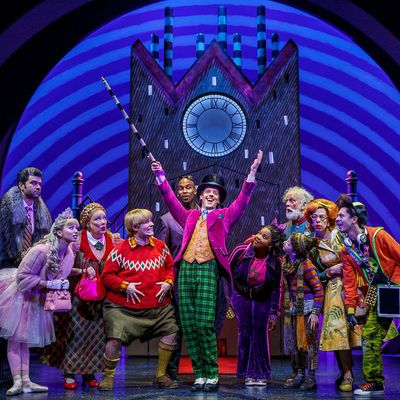
Though often described as confections, musical comedies have no known recipe. If they did, a show like Charlie and the Chocolate Factory, which opened on Broadway tonight, ought to have been a treat. Its main ingredients include the beloved 1964 children’s book by Roald Dahl and the two successful movie musicals it inspired: one (renamed Willy Wonka and the Chocolate Factory) starring Gene Wilder in 1971 and one (under the original title) starring Johnny Depp in 2005. The last Dahl adaptation, Matilda, was an international hit. David Greig, who wrote the new show’s book, is a much-lauded playwright in England and his native Scotland. The songwriters Marc Shaiman and Scott Wittman, best known for Hairspray in 2002, have since provided top-drawer scores for Fame Becomes Me, Catch Me If You Can, and (God help us) Smash. In hindsight, perhaps it was a sign of trouble that Sam Mendes, who directed the London production — which ran for three and a half years — declined to direct again for New York, but Jack O’Brien, who staged Hairspray, quickly came aboard. So did Christian Borle, a two-time Tony-award winner, to play Willy Wonka, the eccentric chocolatier.
So why did the thing turn into a hideous, cheap-looking, melted Whitman’s sampler?
The glib answer is: too many cooks. (The confectionery puns are inevitable in writing about a show that has little other content.) The longer answer begins with Dahl. On the page, Charlie and the Chocolate Factory immediately reveals itself as a bad candidate for stage musicalization, despite a number of so-called songs (actually weird doggerel) already in the text. For one thing, the story is so heavily patterned it quickly grows both predictable and laborious: One at a time, five children find the golden tickets that Wonka has hidden in his chocolate bars; when they come to the factory to claim the grand prize, they are eliminated in aptly awful ways until only our hero, Charlie Bucket, remains. (We know he is our hero because he is neither fat nor rich nor gross nor acquisitive.) To the extent Dahl invests much writerly energy in anything, it’s not in evocative dialogue or depth of character but in the imaginative products and bizarre processes of the factory: the squirrels who sort the nuts, the Oompa-Loompas who make the chocolate, the glass elevator to anywhere. Dahl is also keenly interested in the punishments for the losing children. (One of them turns into a giant blueberry; another gets flushed down a garbage chute.) As such, it’s both a weird read and a disturbing one, having crossed over from the delightful snark and shiver of other Dahl books like Matilda and The BFG into something that’s borderline sadistic.
The two movie adaptations got around these problems by substantially altering the story (in different ways) and playing up the fantasy and special effects. For the stage musical those solutions were themselves problems. With fans invested in the different versions of the tale, the authors, perhaps at the behest of the rights holders, seem to have felt obligated to include elements of all three, leading to a confusion of characterization and tone that Greig could not resolve. (Shaiman and Wittman do a better job of interpolating into their professional but unmemorable score “The Candy Man Can” and “Pure Imagination,” two Anthony Newley–Leslie Bricusse songs from the 1971 movie.) And when the theater is in competition with film over special effects, theater will lose. Understanding this, and apparently in response to the London production’s elaborateness, O’Brien rebuilt the New York version as a simpler affair, hoping the audience would use its imagination to fill in the blanks; the result is an unusually dull set design by Mark Thompson and effects that would hardly have seemed special 20 years ago. When Wonka, who has spent much of the first act in disguise as a candy store owner in order to give Borle something to do, reveals himself as the grand wizard of chocolate, the transformation scene involves a crowd gathering around him while he takes off his overcoat.
At least the Oompa-Loompas are fun — the first one or two times we meet them. Even so, I doubt this musical would have proved at all likable even if an apt style and thrilling visuals had been found for it. The story is too maudlin and, at the same time, too angry. It’s fundamentally self-cancelling: Wonka, despite Borle’s somewhat listless attempts to justify him, is hardly more likeable than the awful kids (played by adults) and their families, whereas Charlie and his family are sweet but negligible. “Want to change the world? / There’s nothing to it” goes a typically gassy lyric from one of the interpolated songs — but Charlie and the Chocolate Factory is a lesson in what happens when pure imagination sours.
Charlie and the Chocolate Factory is at the Lunt-Fontanne Theatre.

